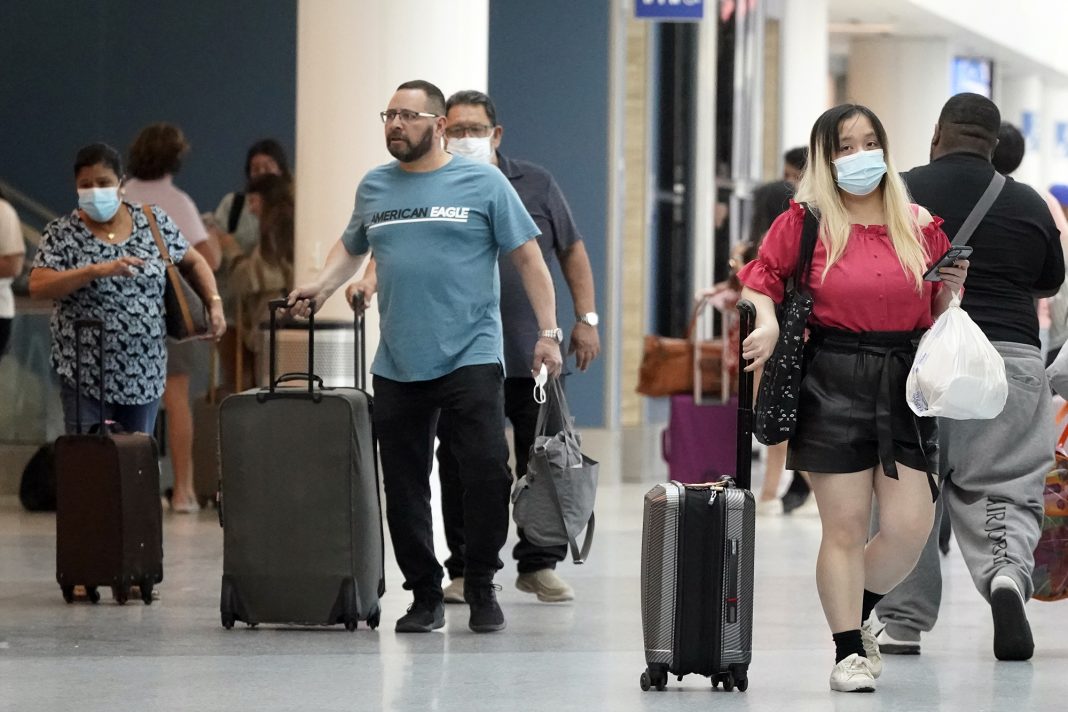While face masks aren’t mandatory on public transportation or in related transportation hubs, the Centers for Disease Control and Prevention (CDC) recommends COVID-19 testing before travel. The national health agency suggests people “consider” getting a viral test – laboratory, rapid point-of-care or self-tests – done “as close to the time of departure as possible,” so travelers will know if they have a “current” coronavirus infection before they depart. These tests, if completed by a concerned party, should be done no more than three days before travel, according to the CDC. Although pre-travel testing isn’t mandated on most forms of domestic transportation, the CDC’s guidance has been updated at a time when coronavirus infections are on the rise in the U.S. Johns Hopkins University’s COVID-19 Dashboard reported more than 100,000 coronavirus cases in the U.S. on Wednesday, May 18. Infections had been on a decline since the end of March but are now increasing steadily. “Given the — the spread of infections that’s happening across the country, we know [the] use of rapid tests is a very effective way of keeping infections down,” said Dr. Ashish Jha, coordinator of the White House’s COVID-19 Task Force, at Wednesday’s press briefing. “You can test yourself before you go to a large gathering, before you go visit someone vulnerable,” Jha continued. “There’s very good evidence that the use of rapid tests can reduce the amount of infections that’s happening out there. So this is one of the tools we have, one of the capabilities we have.” Outside of testing, another pre-travel tip officials at the CDC offer travelers during the lingering pandemic include checking their intended destination’s infection risks with the CDC’s online COVID-19 Community Level tool, which identifies infection risks weekly by county. The CDC also recommends checking mandates about mask wear, vaccination, testing and quarantining from local governments and airlines. Travelers with medical conditions or who have prescribed medications that weaken immune systems are advised to consult their doctors before they make their journeys. Travel is not recommended by the CDC’s standards if a person shows COVID-19 symptoms (regardless of vaccination status) or receives a positive viral test. If a positive COVID-19 test is received, the CDC says self-quarantining should be done for “a full 10 days.” Travel can usually be resumed after this point. People who have been in close contact with someone who received a positive COVID-19 test are advised to quarantine for five days and practice coronavirus safety precautions if travel is necessary after six to 10 days of exposure, which could include viral testing and mask wear. Some travelers who have been in close contact with someone who has COVID-19 can skip testing and isolation if they tested positive for the virus within the past 90 days, but the CDC still recommends mask wear when in public or optional viral tests if symptoms start to show up. The CDC reiterates that it recommends “well-fitting” masks or respirators for people over the age of two “in indoor areas of public transportation (such as airplanes, trains, buses, ferries) and transportation hubs (such as airports, stations, and seaports), especially in locations that are crowded or poorly ventilated such as airport jetways.” The agency also urges the public to be “up to date” with COVID-19 vaccines before traveling. On Tuesday, May 10, the TSA announced that it’s preparing for a “busy summer travel season.” The security agency explained that daily passenger volumes have increased at checkpoints nationwide, and it anticipates this volume could match or “occasionally exceed those of 2019 for the first time since the pandemic began.”
From: nypost
URL: https://nypost.com/2022/05/20/cdc-recommends-travelers-get-tested-for-covid-before-departure/



